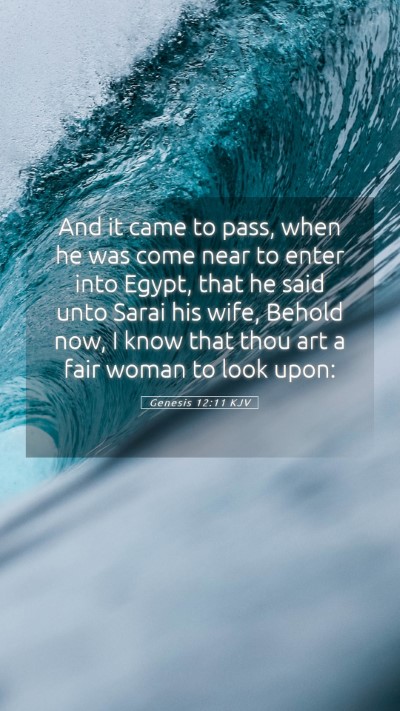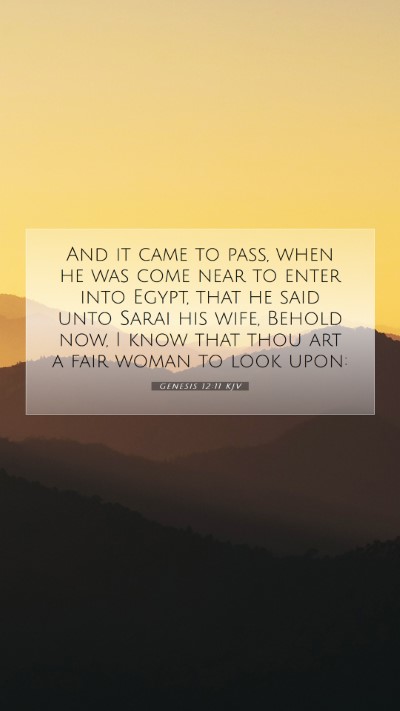Understanding Genesis 12:11
In Genesis 12:11, we encounter a significant moment in the life of Abram (later named Abraham) during his early journey of faith. The verse states:
"And it came to pass, when he was come near to enter into Egypt, that he said unto Sarai his wife, Behold now, I know that thou art a fair woman to look upon."
Overview of Genesis 12:11
This verse is pivotal as it reveals Abram's initial fear and strategic thinking as he approaches the foreign land of Egypt. Notably, it reflects themes of human vulnerability and reliance on God amidst uncertainties. Here, Abram acknowledges Sarai's beauty, which he fears might provoke the Egyptians to harm him to possess her.
Insights from Commentaries
Several public domain commentaries provide rich insights into the meaning of this verse:
-
Matthew Henry:
Henry highlights the human aspect of Abram's character, noting that fear rather than faith temporarily influences him. He discusses the moral dilemma Abram faces as he fears for his life. This moment underscores the frailty of human confidence, emphasizing that even great figures of faith experience moments of weakness.
-
Albert Barnes:
Barnes provides a contextual analysis, explaining that Abram's journey into Egypt represents a departure from the promised land of Canaan. He underscores the motivations behind Abram’s actions, suggesting that they reflect a lack of trust in God’s protection. This serves as a precursor to the trials that Abram and Sarai will face as they navigate through foreign territories.
-
Adam Clarke:
Clarke adds that Abram's acknowledgement of Sarai’s beauty and his consequent actions demonstrate a pattern of human behavior — valuing survival over divine promise. He points out that while Abram’s fears lead him to act strategically, they also reveal a deeper susceptibility to human anxieties, which serve as a warning for believers regarding dependency on God's guidance instead of human wisdom alone.
Thematic Analysis
This verse encapsulates several key themes prevalent throughout the Bible:
- Fear and Trust: Abram's actions show a conflict between fear of man and trust in God.
- Beauty and Possession: The emphasis on Sarai’s beauty highlights societal values regarding physical appearance and the lengths individuals might go to possess that which is desirable.
- Moral Complexity: The ethical implications of Abram's intentions unfold, showing how difficult decisions can arise from fear.
Application to Daily Life
Understanding this verse has practical implications for modern believers:
- It encourages self-reflection on how fear influences our decisions.
- It serves as a reminder to trust in God’s promises and provisions, even in uncertain circumstances.
- It invites discussions in Bible study groups about the nature of faith and fear, fostering deeper Bible study insights into how individuals confront challenges in their lives.
Scripture Cross References
The themes in Genesis 12:11 resonate with various other biblical passages, offering a broader understanding of its significance:
- Genesis 20:2-7: Abram's repetition of similar schemes regarding his wife Sarai.
- Psalm 56:3: A psalm that expresses trust in God even in the face of fear.
- Isaiah 41:10: A reassurance of God's presence in times of fear.
Final Thoughts
Genesis 12:11 serves as a crucial point for Bible verse analysis and a reminder of the complexities of the human experience in faith. By reflecting on this verse and utilizing resources such as Bible study guides and Bible study materials, believers can gain deeper insights into scripture and apply these lessons to their daily lives.
The exploration of this passage is not just an academic exercise, but a vital practice in understanding Scripture and arming ourselves with spiritual knowledge that can inform our walk with God.


